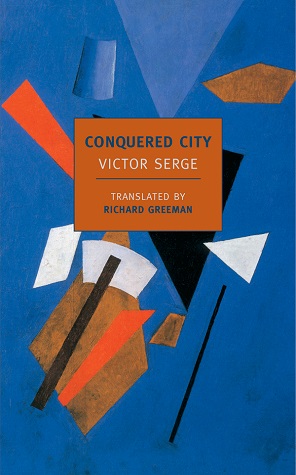
by by Margaret Kolb

Published by NYRB Classics, 2011 | 224 pages
“We have conquered everything and everything has slipped out of our grasp. We have conquered bread, and there is famine. We have declared peace to a war-weary world, and war has moved into every house.” There is a peculiar sense of betrayal that shadows political hope. From Obama’s presidency to the Arab Spring, the initial euphoria of change is often swiftly followed by disillusionment, with all its attendant cynicism, outrage and cries of hypocrisy.
For the left, few historical events have provoked as much hope or led to greater disenchantment than the Russian Revolution. First published in French in 1932 and now enjoying the status of a NYRB Classics edition, Victor Serge’s novel Conquered City captures the passions, the disappointments, the mundanities and the tragic ironies of the revolution’s aftermath. It is set in an “exhausted, besieged” St. Petersburg during the Civil War that followed the Bolsheviks’ seizure of power in 1917. Indeed, St. Petersburg itself is the novel’s main subject and its tracking of urban rhythms calls to mind Dziga Vertov’s famous Man with a Movie Camera (1929).
Serge’s dedication of Conquered City to his French and Spanish comrades, urging them to “rescue the true face of the Revolution from oblivion and legend,” is an immediate indication of his own deep involvement in the era’s political upheavals. Born in Belgium in 1890, Serge’s remarkable life – encompassing anarchism and imprisonment in France, international missions for the Comintern and expulsion from the Soviet Communist Party, associations with Gide, Gorky and Gramsci followed by exiled poverty in Mexico, where he died in 1947 – remains the subject of intense fascination and debate, as Richard Greeman’s brilliant introduction to Conquered City confirms. His participation in some of the twentieth century’s most important political events is chronicled in Memoirs of a Revolutionary (1963), also recently back in print thanks to NYRB Classics.
Conquered City is structured around twenty interlinked episodes which take place over the course of one year. It involves dozens of characters, many of whom appear in only one or two sections, while time skips and jolts onwards in irregular bursts. This fragmentary form can in part be attributed to the conditions in which the novel was written. After his expulsion from the Communist Party, Serge lived in a communal apartment under constant surveillance. Fearing arrest at any moment, he dispatched individual chapters as soon as they were finished.
Yet, its episodic nature is more than just a pragmatic response to an oppressive artistic environment. Like Joyce’s Dublin, Eliot’s London or Dos Passos’s New York, Serge’s St. Petersburg is a modernist montage of disparate voices and media. In Conquered City, we hear debates, speeches and conspiracies, workers issuing demands and mothers arguing with their children. We attend committee meetings and lectures on world history. We read newspaper headlines, coded messages and notes advertising dance lessons. In seeking to index the city, Serge’s prose is permeable to all its signs and sensations. Rather than following any one person, the novel circles the city, probing streets and bridges at will. Its perceptions, cinematic in their motion, are constantly shifting – from the queues at communal stores, where people are “gathered like woodlice in a hole,” to a get-together of the Supreme Council, whose members resemble “the board of directors of a firm which is losing money at a terrific rate.”
The St. Petersburg of Conquered City is caught between the heady rhetoric of revolution – “We must smash everything. Purify everything by fire,” urges one young Bolshevik – and the sapping realities of civil war. Everyone and everything in it seems encrusted with dirt or infested with lice. Even the city’s “beautiful broad river” is said to carry “the bacilli of cholera, dysentery, and typhus.” Rationing dominates conversations, factories lie stagnant and fears of a “monstrous state rising from the ashes of the Revolution” begin to heighten. Hopes for a just new order descend into hunger and terror.
Conflicting emotions swirl in the minds of the city’s inhabitants. A member of the Special Commission (a state security organisation designed to combat counter-revolutionaries) sleeps in his boots within one of the many “dead palaces” requisitioned by soldiers. As he organises supplies and transmits orders, devastated by fatigue, he harbours “murky second thoughts” about the revolution, but reassures himself with the mantra: “It is necessary.” An elderly professor, who lectures in his hat and fur cloak, is sceptical of humanity’s ability to create lasting historical change: “Night was the same on this river centuries ago. Centuries will pass, night will be the same.” By contrast, his friend, an enthusiast for the revolution, is convinced that nature itself will be overcome by the will of the masses, that the “cold, the night, everything […] will be conquered” if the Bolsheviks hold power for a decade. An artist switches, without a beat, from painting bathing girls to depictions of class struggle. Overshadowing all these events and characters are the omnipresent figures of Lenin and Trotsky. Unnamed by Serge, their famous portraits – the former wearing “a crafty, vaguely cruel expression” beneath his balding forehead, while the latter “darted a brilliant glance into the abstract, through his rimless glasses” – seem to miss nothing that goes on in the city, like the ominous eyes of Doctor T. J. Eckleburg in The Great Gatsby (1925).
Strangely, though, the novel’s omniscient perspective on St. Petersburg is interrupted at various intervals by a first-person narrative voice. This ‘I’ has at times a distinctly physical form, greeting colleagues and exchanging gossip, and yet it too seems capable of unrestricted movement throughout the city – a singular mind that also operates as a collective consciousness. When, later in the novel, a character argues, “We haven’t yet discovered what the new place of the individual is in the age of masses,” it is a comment that applies as much to the narrative multiplicities of Conquered City as to the social transformations the book depicts.
Above all, Conquered City is filled with a deep sense of melancholia. Serge’s warm, nimble and generous tone is alert to the comic ironies of the age, the “funerals and celebrations” of its war-torn city, but it never shakes off a feeling of profound melancholy concerning the direction in which the revolution is heading. As such, it is much less acerbic or explicitly satirical than other novels depicting political betrayal, most obviously George Orwell’s Animal Farm (1945). Written over a decade after the events in question, Conquered City cannot help but bear traces of further terrors that occurred in the intervening period. Throughout his writings, Serge maintained a commitment to a revolutionary Socialism that rejects totalitarian rule, yet his novel asks (ruefully, painfully), “What makes things turn out the way they do?” Despite the Red Army’s miraculous triumph, the ellipsis that ends Conquered City feels less like an expression of hope or a glimpse of redemption, and more like a final nod to history’s tragic path.
Richard Martin completed his PhD at Birkbeck, University of London. He is now based in Berlin, where he is writing a book on architecture and cinema.















click to see who
MAKE Magazine Publisher MAKE Literary Productions Managing Editor Chamandeep Bains Assistant Managing Editor and Web Editor Kenneth Guay Fiction Editor Kamilah Foreman Nonfiction Editor Jessica Anne Poetry Editor Joel Craig Intercambio Poetry Editor Daniel Borzutzky Intercambio Prose Editor Brenda Lozano Latin American Art Portfolio Editor Alejandro Almanza Pereda Reviews Editor Mark Molloy Portfolio Art Editor Sarah Kramer Creative Director Joshua Hauth, Hauthwares Webmaster Johnathan Crawford Proofreader/Copy Editor Sarah Kramer Associate Fiction Editors LC Fiore, Jim Kourlas, Kerstin Schaars Contributing Editors Kyle Beachy, Steffi Drewes, Katie Geha, Kathleen Rooney Social Media Coordinator Jennifer De Poorter
MAKE Literary Productions, NFP Co-directors, Sarah Dodson and Joel Craig